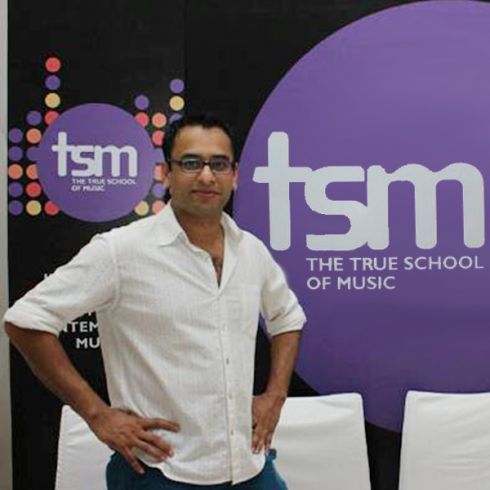
MUMBAI: The momentary pause that blueFROG's changes might have afforded some rare me time for Ashu Phatak to explore another holidaying destination, or so one would think. But his responsibilities seem to have only increased. The workaholic co-founder of blueFROG now shifts the entire focus to another project he co-founded – True School of Music – that recently laid down its ‘bigger picture’ plans.
In its three years so far, the basic characteristics identifying a music school have defined the True School of Music’s (TSM) early success too. Phatak brings a lot of credibility through his work, and that reflects on the multiple platforms inviting him to the respective stages as a mentor and a guide. But has Phatak managed to extend the attribute to the elements of his school – the foundation, faculty and students? The students would agree, the industry would provide the numbers to prove the case, and Phatak would “rather talk about the future.” And the future, as Phatak describes over the phone, is a bit more reliant on technology.
"The institute will soon launch a vocal app, purely focused on training aspirants the basic and detailed aspects of mastering the vocal duties. The circular based app will be present across operating systems and would further help the students practise from wherever they feel convenient,” informed Phatak, a vocalist and a multi-instrumentalist himself, adding that more applications will follow the first app. "Vocals would be a start. Soon, we would continue the process with other instruments. Creating an app requires a lot of homework, and we need to ensure it’s completely user-friendly.” And rightly so, in the short span of three years, TSM has, indeed, created an identity, at least unparalleled in this part of India.
Phatak explained the school’s mission does not only necessarily restrict to shaping professional self-sustaining musicians out of the naïve, excited and recently-enrolled students. “The mission is to create ‘musicpreneurs’ now,” elaborated the co-founder. The late 2000s grew kinder towards musicians from the non-mainstream space, with the increasing demand for jingle composers, session musicians and emphasis on ‘younger perspective’ towards production. Fortunately, for Phatak and Nitin Chandy (the other co-founder of TSM), opportunities in the music industry came aplenty. And when they did not, the duo just created them (blueFROG being one of the examples).
Getting started in the music industry never really has been a walk in the park, unless you know somebody who knows somebody who can afford average untrained professionals. Steve Vai or Metallica or Kanye West or Radiohead or more domestic names like The F16s or Kailasa or Midival Punditz or Nucleya do not randomly put materials out in the market for the sake of it. A proper strategy is involved behind the execution of the same. TSM covers the few vital criteria for an ideal beginner as well as aspiring talent’s demands. Experienced faculty, elaborate internship offers, a strong reputation and placement assistance as soon as the course concludes. “It usually takes a longer time to create the kind of reputation we did. Right now, one can observe, there is more demand and less supply in this industry. For any music school, the priority needs to be raising awareness about careers in music. TSM is specifically designed and redefined to create careers.” The surge in the opportunities from the Bollywood and advertisement space needs to be tapped, understands Phatak, and believes the two platforms allow students to earn five times more money than other projects. Long gone are the days when jingles and Bollywood music were looked down or perceived as distractions. If not a priority, the two spaces, indeed, helps you sustain in the competitive world.
The emphasis on a specific method of teaching brings out the individuality of a musician, added Phatak – the frontman of his own band, a jingle and film music composer. Presenting the further details about the school’s immediate plans, Phatak also informed about the plans to set-up pop-up schools, starting with Goa, where teachers would fly down to the state to do the needful. Apart from that, TSM will continue its associations with existing smaller schools and continue the practice through tie-ups with schools from other corners of the country. With courses offering from rupees 6,000 per month to rupees 80,000 per module, achieving one’s dreams through TSM would surely create a few obstacles and the school has acknowledged the fact through a range of scholarship programs with an intention to encourage budding artists, sound engineers and music producers to pursue the ambition.
TSM hosts an impressive faculty from the country and overseas, and ironically, similar to almost every music school across the globe, the Lower Parel-based institute’s faculty members never required a formal education to learn music (at least most of them). Upon asked how a music school act as a catalyst to a student’s growth, Phatak simply replied, “In a way, what one can learn in five years on his own, can learn in a couple of years at a school. The Bob Dylans, Eddie Vedders and Eminems may not have had formal education, but they were exposed to other forms of self-learning exercises that certain aspirants do not. And the music schools create that environment especially for the students.”
For three years, the word-of-mouth helped TSM prosper and gain further credibility at least among the aspirants. The recent initiatives and effort may lead one to wonder if the TSM begins to venture into other ‘beyond the syllabus’ activities, and no movements indicate otherwise. TSM’s students find themselves in established studios, popular live venues, emerging acts and musicians’ contact lists, and that Phatak counts as success. True, it’s more than a School of Music now. Does this lead to the qualification of TSM as a music business school? Not necessarily. True School of Music, just like Phatak, is all about emotions – an attribute the workaholic did manage to pass on to the project.